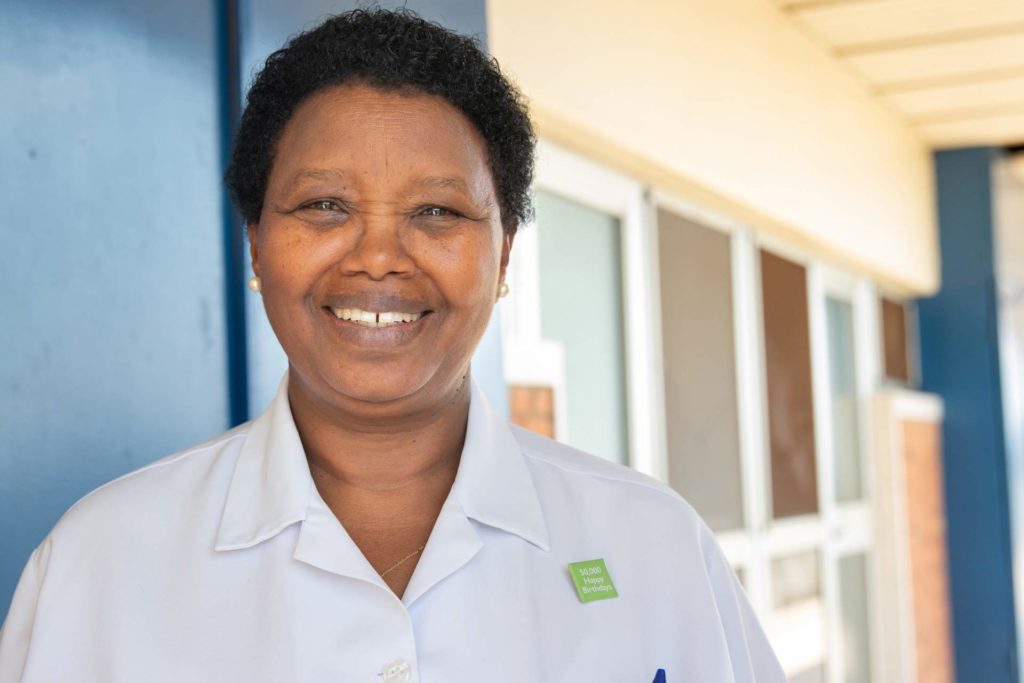Goal 4
Strengthen the capacity of national Midwives’ Associations
Effective in-country leadership is essential to ensure relevance and sustainability of project interventions and alignment with Ministry of Health strategic priorities.
Midwives’ Associations have established alliances with their respective Ministries of Health and have an in-depth understanding of the needs of the health workforce and the women, newborns and families they serve. Needs assessments were conducted at the start of the project, which helped the Associations reflect on their function and capacity and guided ICM’s development of priority interventions.

Low-dose, high-frequency support to Midwives’ Associations
Throughout this project, ICM provided frequent, short, remote, and face-to-face mentorship to the participating Midwives’ Associations.
Four focus areas which had the biggest impact on Association functioning were: Governance and Leadership, Planning and Implementing Projects, Partnerships and Networks, and Representation and Reporting
Governance and Leadership
Midwives’ Associations improved their membership management, services and communication which provided additional revenue from increased financial memberships
Planning and Implementing Projects
Midwives’ Associations improved their capacity in budgeting and financial management
ICM supported Associations to develop activity plans, coordinate LDHF practice sessions, and create schedules for cascade training and supportive supervision visits
ICM and LGH supported Associations to conduct inventories of available in-country HMS/HBS training resources and clinical service equipment
ICM and LGH supported Associations to develop relevant international procurement of training and service equipment and coordination of distribution to implementation sites
Partnerships and Networks
Priority training locations were determined collaboratively with Midwives’ Associations, Ministries of Health, other national stakeholders and international partners
Improved partnerships with other Health Professional Associations (Obstetrician and Gynecologists, Pediatricians, Nurses) increases understanding of health workforce needs
Supporting public and private health facilities and educational institutions aligns best practice for women and newborns
Representation and Reporting
Communication and advocacy of MNH issues on national social media platforms
Association project managers represented the project at international conferences, increasing awareness of the HMS and HBS educational programs
Other maternal and newborn healthcare providers expressed an increased understanding of the midwifery profession and midwives expressed a sense of pride in their profession
The Partner Coalition collaboratively developed the scope of work for Association Project Management team and country Master Trainers, and recruited skilled and motivated Supportive Supervisors and Practice Coordinators.
As part of the project, the MAs conducted a capacity assessment using ICM’s Midwives’ Association Capacity Assessment Tool (MACAT)
The MACAT measures capacity across 7 domains
Governance
Board, Vision and Mission, Goals and Strategies, Legal Status
Management Practices and Leadership
Administrative Policies and Procedures, Infrastructure and Information Systems, Authority and Accountability, Human Resources
Financial Resource Management
Accounting, Budgeting, Financial Information
Functions
Membership Services, Advancing Professional Practice, Quality Control for Care, Communication, Advocacy, Service Delivery
Collaboration, Partnerships, Networks
Engagement with Women, Government, NGOs, Donors, Private Sector
Visibility
Media Relations, Women’s Health Advocates, Stakeholders, Government
Sustainability
Diversified funding, Resource Mobilisation, Proposal Writing
MAs baseline and endline MACAT results
The MACAT results show impressive improvements overall, but should be interpreted with caution. Some capacity building needs remain to be addressed.
ICM is developing an updated MACAT to expand the assessment criteria and further support Midwives’ Associations to develop and extend their supportive function to their midwife members and beneficiaries.

Impact
In Ethiopia, the Association’s status and membership base increased during the project. EMwA developed new national and international partnerships as a result of the project which resulted in additional opportunities to improve maternal and newborn health outcomes.
In Rwanda, the status of the Association greatly increased during the project implementation period with RAM now being a more visible actor at government level, and among health professionals. A master trainer concluded that “RAM actions are shining” as they have expanded their scope and network during the project.
In Tanzania, the Association’s visibility and esteem grew during the project. Their membership base also greatly increased. TAMA is a much favoured partner of local and national level government, exemplified by their inclusion in a range of high-level meetings and technical working groups.